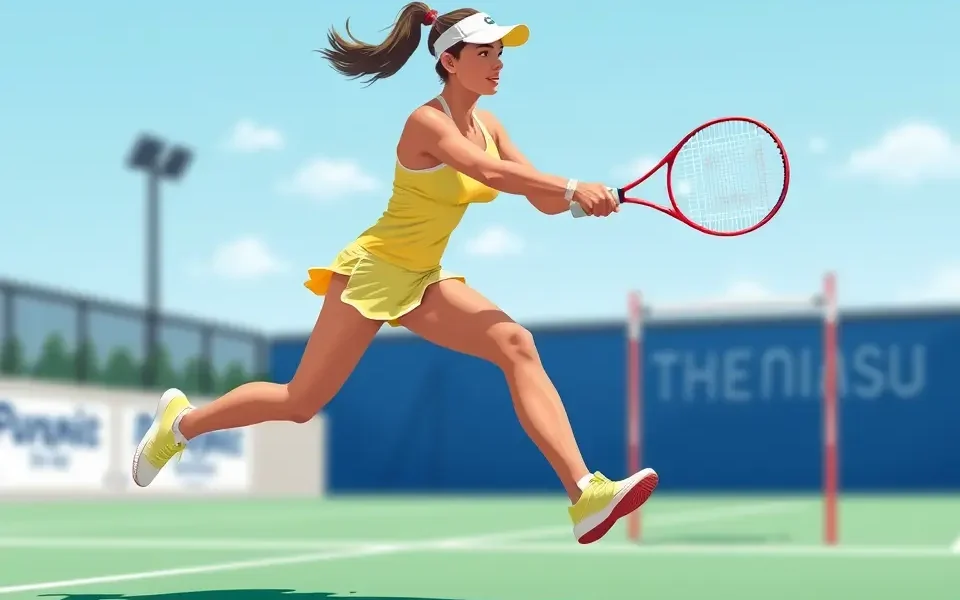While the tennis world continues to dissect Emma Raducanu’s coaching carousel, British tennis legend Tim Henman suggests a different focal point: her physical resilience. Raducanu’s recent performance at the Miami Open, where she reached the quarter-finals, has sparked renewed optimism, but Henman believes her ability to maintain fitness and consistently compete will be the true test of her potential.
Raducanu’s Coaching Changes: A Constant Talking Point
Emma Raducanu’s frequent coaching changes have been a recurring theme throughout her career, particularly since her historic US Open victory in 2021. She has worked with several coaches, including Nigel Sears, Andrew Richardson, Torben Beltz, and most recently, Nick Cavaday. The reasons for these changes have varied, ranging from differing philosophies to health concerns.
- Public Scrutiny: Raducanu’s coaching decisions have often been met with public scrutiny, with many questioning the stability of her team.
- Raducanu’s Perspective: Raducanu has stated that she is a “loyal person” and that frequent coaching changes are not her preferred approach. She has also mentioned that she asks her coaches a lot of questions and that sometimes they “haven’t been able to keep up.”
- Expert Opinions: Tennis experts like Patrick Mouratoglou have expressed concerns about the impact of constant coaching changes on Raducanu’s development, emphasizing the need for stability.
Despite the external noise, Raducanu remains focused on finding the right support system to help her achieve her goals. In February 2025, she added Tom Welsh as an interim coach, along with Yutaka Nakamura, to her team for the Indian Wells tournament, indicating her proactive approach to seeking guidance.
Henman’s Focus: Physical Resilience as the Key
Tim Henman, a respected figure in British tennis, believes that the primary challenge for Raducanu lies in building “physical resilience.” He emphasizes the importance of staying fit and playing a full WTA Tour schedule.
- Miami Open Performance: Henman praised Raducanu’s fighting spirit during her Miami Open run, where she reached the quarter-finals, her best result since the 2021 US Open.
- Overcoming Fatigue: Henman noted that Raducanu showed signs of fatigue during her quarter-final match against Jessica Pegula, highlighting the need for improved physical conditioning.
- Foundation for Success: Henman believes that a strong fitness foundation is crucial for Raducanu to build on her potential and achieve consistent results on the tour.
Henman’s perspective aligns with concerns raised by others in the tennis community, including John McEnroe, who has questioned whether Raducanu’s physical and mental challenges are interconnected.
The Health Factor: A Lingering “Question Mark”
Martina Navratilova has also weighed in on Raducanu’s situation, identifying her health as the “biggest question mark.” Navratilova pointed to Raducanu’s struggles with dizziness and feeling faint during her match against Pegula as evidence of underlying health concerns.
- Stress and Physical Condition: Navratilova suggested that stress may have contributed to Raducanu’s physical issues, emphasizing the importance of managing both mental and physical well-being.
- Impact on Ranking: Navratilova believes that if Raducanu can stay healthy and maintain her current form, she has the potential to move up the rankings and be seeded at major tournaments like Roland Garros.
Raducanu’s health has been a recurring issue, with injuries and setbacks disrupting her progress since her US Open triumph. In late 2024, she brought in fitness coach Yutaka Nakamura to address these concerns and help her return to full strength.
Injury History and Fitness Concerns
Raducanu’s career has been marked by a series of injuries that have hampered her progress.
- Withdrawals and Setbacks: She has been forced to withdraw from several tournaments due to various physical issues, including a back injury that caused her to miss the ASB Classic in Auckland in early 2025.
- Impact on Consistency: These injuries have made it difficult for her to maintain consistency and build momentum on the tour.
- Former Fitness Coach Criticism: Kieron Vorster, Tim Henman’s former fitness coach, has publicly criticized Raducanu’s fitness, accusing her of not playing enough matches.
Raducanu herself has acknowledged the importance of addressing her physical issues, stating that she is determined to give them the proper time to heal.
Addressing the Mental Game
While physical resilience is a key focus, the mental aspect of the game cannot be ignored. John McEnroe has raised concerns about Raducanu’s mentality, suggesting that it may be contributing to her injury woes.
- Interconnectedness: McEnroe believes that the physical and mental aspects of Raducanu’s game are interconnected, making it difficult to determine which is causing more problems.
- Doubt and Pressure: He questions whether her physical issues are causing her to doubt herself or whether self-doubt is leading to physical problems.
- Finding the Right Balance: Raducanu needs to find the right balance between pushing herself and avoiding overexertion to maintain both her physical and mental well-being.
The Path Forward: Building a Solid Foundation
As Emma Raducanu navigates her career, building a solid foundation of physical and mental resilience will be crucial. While coaching changes will continue to be a topic of discussion, focusing on her overall well-being and ability to consistently compete may be the key to unlocking her full potential.
- Long-Term View: Tim Henman advises taking a long-term view of Raducanu’s development, emphasizing that she has plenty of opportunities ahead of her.
- Learning from Experience: Raducanu’s recent experiences, including her time away from the court due to injuries, have provided her with valuable opportunities for reflection and growth.
- Realistic Goals: With a focus on physical resilience and a strong support system, Raducanu has the potential to achieve realistic goals, such as moving back into the world’s top 30.








No Comment! Be the first one.